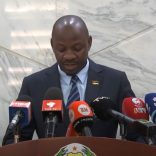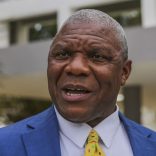EUMAM MOZ receives visit of US delegation
Stability assured, but still lack of basic services and food for the population — minister

Photo: Lusa
Mozambican Defence Minister Cristovão Chume said on Monday at the end of a visit to Cabo Delgado that stability was assured, but there is a lack of basic services and humanitarian support to feed the population.
The “immediate” objective of the operations “was to free the zones and create basic conditions for the return of the population”. This had already happened, “but it is not the end yet”, Chume said when summarising the visit, two years after the arrival of foreign troops to support Mozambique in combating the armed insurgency in the province.
“In some areas we are at 60%” of population return, “in Palma almost 80%, but we still have great challenges”, Chume underlined in Pemba after travelling with a delegation of journalists through Afungi, Mute, Mocímboa da Praia and Palma.
The challenges lie in guaranteeing “basic services”, such as “water, health, infrastructure and humanitarian support to lift the population out of poverty” – poverty in the sense of “not having something to eat”, the defence minister stressed.
“We still have some challenges, but in terms of stability, this has been achieved,” Chume said.
Mocímboa da Praia was one of the highlighted examples, with the ministry of defence pointing out that the town, which “was considered the capital of terrorists”, now has “more residents than before being occupied”.
There is freedom of movement “without security restrictions”, Chume said, even while acknowledging that the defence and security forces were still recommending caution in some areas where terrorist cells still circulate.
Cristóvão Chume said that the return of the population – about a million displaced people who had fled armed attacks in the last five years – is the ‘thermometer’ with which he measures the stability of the province.
But the trend also puts pressure on the need to re-establish services.
In addition to public services, the Minister of Defence appealed to banks to reopen their branches, because the resumption of commerce and other activities would mean more money on the streets, and he would prefer to see it in banks instead of circulating via less lawful activities.
Cabo Delgado province has been facing an armed insurgency for five years, with some attacks claimed by the extremist Islamic State group.
The insurgency has led to a military response since July 2021 with support from Rwanda and the Southern African Development Community (SADC), liberating districts near the province’s natural gas projects, but new waves of attacks have emerged in the south of the region and in the neighbouring province of Nampula.
The conflict has already displaced one million people, according to the United Nations, and cost around 4,000 lives, according to the ACLED conflict registration project.












Leave a Reply
Be the First to Comment!
You must be logged in to post a comment.
You must be logged in to post a comment.